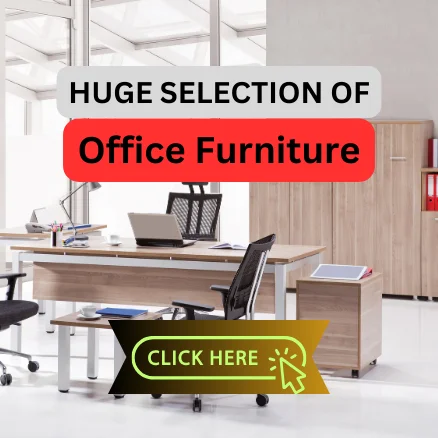So, you’re sitting at your desk, staring at your worn-out office chair, and wondering if it’s finally time for an upgrade. But before you hit that “add to cart” button, you can’t help but wonder – is buying an office chair tax deductible? It’s a valid question, one that many workers and small business owners have pondered. In this article, we’ll break down the ins and outs of office chair tax deductions, uncovering whether you can actually save some money while sitting in style.

Is Buying An Office Chair Tax Deductible?
What is a tax deduction?
A tax deduction is a financial benefit that reduces the amount of income that is subject to taxation. By deducting certain expenses from our taxable income, we are able to lower the amount of taxes we owe to the government. In other words, a tax deduction helps to reduce our overall tax liability, potentially increasing the size of our tax refund or decreasing the amount we owe.
Definition of a tax deduction
A tax deduction is an expense that is recognized by the Internal Revenue Service (IRS) as being eligible for a reduction in taxable income. These deductions are allowed by the IRS based on specific rules and regulations, and they can vary depending on our individual circumstances and the type of deduction.
How tax deductions work
Tax deductions work by lowering our taxable income. When we file our income tax return, we report all of our income for the year. The IRS then allows us to subtract certain eligible expenses from that total income, giving us a lower taxable income. This reduction in taxable income ultimately leads to a decrease in the amount of income tax we owe.
Types of tax deductions
There are two main types of tax deductions that we can claim: the standard deduction and itemized deductions.
Standard deduction
The standard deduction is a set amount that the IRS allows us to deduct from our taxable income without having to provide any additional documentation or itemize our expenses. The standard deduction amount varies depending on our filing status, such as single, married filing jointly, or head of household. For many taxpayers, the standard deduction is a simple and straightforward way to reduce their taxable income.
Itemized deductions
Itemized deductions, on the other hand, require us to provide documentation and details about our specific expenses in order to claim them. Itemized deductions can include things like medical expenses, state and local taxes, mortgage interest, and charitable contributions. By carefully tracking and documenting these expenses, we may be able to increase our deductions, potentially resulting in a larger tax benefit.
Home office deduction
For those of us who have a home office, we may be eligible for a special type of tax deduction known as the home office deduction. This deduction allows us to deduct expenses related to the portion of our home that is used exclusively for conducting business.
Eligibility for home office deduction
In order to be eligible for the home office deduction, we must meet certain criteria. First, the space we are claiming as our home office must be used exclusively for business purposes. This means that using a room as both a home office and a guest bedroom, for example, would likely disqualify us from claiming the deduction. Additionally, our home office must be our principal place of business, meaning it is where we conduct the majority of our business activities.
Requirements for claiming the home office deduction
When claiming the home office deduction, we must calculate the business use percentage of our home. This is typically done by dividing the square footage of our home office by the total square footage of our home. We can then apply this business use percentage to certain expenses, such as mortgage interest, property taxes, utilities, and even home maintenance costs, in order to determine the portion that is eligible for the deduction.
Furniture and equipment expenses
When setting up a home office, we may need to purchase furniture and equipment to create a comfortable and functional workspace. The good news is that these expenses can potentially be tax deductible.
What counts as furniture and equipment expenses?
Furniture and equipment expenses include items such as desks, chairs, filing cabinets, computer equipment, printers, and other office-related items. Essentially, any tangible items that are necessary for running our business and are used within our home office space can be considered furniture and equipment expenses.
Deducting furniture and equipment expenses
In order to deduct furniture and equipment expenses, we must meet certain criteria. First, the items we purchase must be used exclusively for business purposes. Additionally, the IRS requires that we either depreciate the cost of the items over a designated period of time or take advantage of the Section 179 deduction, which allows us to deduct the full cost of the items in the year they are purchased.
Is buying an office chair considered a furniture expense?
Office chairs play a vital role in creating a comfortable and ergonomic workspace. But are office chair expenses tax deductible? Let’s explore this further.
Defining office furniture
Office furniture refers to any type of furniture specifically designed for use in an office or workspace. This can include desks, chairs, filing cabinets, bookshelves, and other similar items. Office furniture is typically used to enhance productivity, comfort, and organization within the working environment.
Determining if an office chair qualifies as furniture
When it comes to office chairs, whether or not they qualify as furniture expenses for tax deduction purposes depends on the specific circumstances. If the office chair is used exclusively for business purposes within our home office, it can generally be considered a furniture expense and may be eligible for tax deduction. However, if the chair is used for both personal and business purposes, it may not qualify for the deduction.
Are office chair expenses tax deductible?
The tax deductibility of office chair expenses depends on various factors, including the depreciation of the chair and the business use percentage of our home office.
Depreciation of office chairs
The IRS requires that we depreciate furniture and equipment expenses over a specific period of time. This means that we are only able to deduct a portion of the expense each year, rather than deducting the full cost in the year of purchase. The depreciation period for office furniture is typically 7 years.
Claiming office chair expenses
To claim office chair expenses as a tax deduction, we must meet the criteria set by the IRS. First, the chair must be used exclusively for business purposes within our home office. Second, we must choose whether to depreciate the expense over time or utilize the Section 179 deduction. Finally, we must adjust the deduction amount based on the business use percentage of our home office.
Business use percentage
The business use percentage plays a significant role in determining the tax deduction for home office expenses, including furniture and equipment purchases.
Calculating business use percentage
The business use percentage is calculated by dividing the square footage of our home office by the total square footage of our home. For example, if our home office occupies 200 square feet out of a total home size of 2,000 square feet, the business use percentage would be 10%.
Impact of business use percentage on tax deduction
The business use percentage directly affects the amount of home office expenses that can be deducted. By applying the business use percentage to the total expenses, we can determine the portion that is eligible for deduction. For instance, if we purchased an office chair for $500 and have a business use percentage of 10%, we can deduct $50 as a business expense.
Recordkeeping and documentation
Proper recordkeeping and documentation are crucial when claiming tax deductions, including those related to home office expenses and furniture purchases.
Importance of keeping records
Keeping detailed and accurate records is essential for several reasons. First, it helps us substantiate our claims and ensure that we are compliant with IRS regulations. Second, it provides a clear and organized record of our business expenses, making it easier to prepare our tax return accurately. Finally, good recordkeeping can potentially protect us in the event of an IRS audit.
Required documentation for tax deductions
To support our tax deductions, we should maintain records such as receipts, invoices, canceled checks, and any other relevant documentation related to our furniture and equipment purchases. These records should clearly indicate the date of purchase, item description, cost, and proof of payment. By keeping these documents organized and easily accessible, we can confidently claim our tax deductions with the necessary evidence.
Claiming other office-related expenses
Aside from furniture and equipment expenses, there are other office-related expenses that we may be eligible to claim as tax deductions.
Internet and phone expenses
If we use internet and phone services for business purposes, we can generally deduct a portion of our monthly bills as a business expense. This deduction is typically determined by the percentage of business use versus personal use. Tracking our usage and keeping evidence of bills paid can help support our claim.
Office supplies and stationery
The cost of office supplies, such as pens, paper, printer ink, and folders, can also be deductible if they are used exclusively for business purposes. It is important to keep receipts or other evidence of purchase to substantiate these expenses.
Business-related subscriptions
Professional memberships, trade publications, and other subscriptions that are directly related to our business activities can be claimed as tax deductions. Again, it is crucial to maintain proper records and document the connection between the subscription and our business.
Consulting a tax professional
Navigating the complex world of tax deductions can be challenging. That’s why it can be beneficial to seek advice from a qualified tax professional.
Benefits of seeking professional advice
A tax professional can provide expert guidance and ensure that we are maximizing our eligible deductions while staying within the bounds of the law. They can review our specific situation, help us identify potential deductions, and offer strategies for optimizing our tax advantages. By consulting a tax professional, we can have peace of mind knowing that our tax return is accurate and in compliance with IRS regulations.
Finding a qualified tax professional
When seeking a tax professional, it is important to find someone who is knowledgeable, experienced, and trustworthy. Asking for referrals from friends, family, or colleagues can be a good starting point. It is also advisable to research the credentials and qualifications of any potential tax professionals, such as certified public accountants (CPAs) or enrolled agents (EAs). Taking the time to find the right professional can make a significant difference in achieving our tax goals.
In conclusion, tax deductions play a valuable role in reducing our taxable income and ultimately lowering our tax liability. When it comes to furniture expenses, including office chairs, we may be able to claim them as tax deductions if they meet certain criteria and are used exclusively for business purposes.
Proper recordkeeping, understanding the business use percentage, and consulting a tax professional can help ensure that we maximize our tax benefits and stay in compliance with IRS regulations. By taking advantage of available tax deductions, we can keep more of our hard-earned money and potentially receive a larger tax refund.









